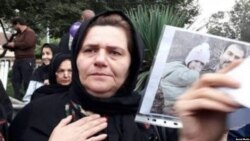A jailed Iranian dissident has ended his latest hunger strike after winning a fight with authorities to receive medical treatment outside prison, even as they rejected his demand to be temporarily released during the coronavirus pandemic.
In a Wednesday interview with VOA Persian from her home in Tehran, the mother of dissident blogger Soheil Arabi confirmed that he had ended his hunger strike at the Greater Tehran Penitentiary earlier in the day.
Farangis Mazloum said authorities allowed Arabi to have surgery last week at a medical facility outside the prison to treat a colonic disease related to her son's multiple past hunger strikes. "He is in a good condition and currently cannot have anything other than water, salt and sugar," she said.
Mazloum also confirmed the authenticity of a letter written by Arabi while in custody and posted online by several Iranian human rights groups on Wednesday.
In the letter, Arabi said he decided to end his latest weeks-long hunger strike at the request of his mother and friends, whose support he credited with enabling him to receive the medical treatment.
Arabi had begun his hunger strike in March, according to Iranian rights groups, and briefly suspended it later that month when promised medical relief by authorities. The groups said he resumed the hunger strike in the first week of April when the promised treatment did not materialize.
Besides medical treatment, the jailed blogger also had demanded a furlough, or temporary release from prison. He has been in detention since November 2013, when authorities arrested him for allegedly posting comments on Facebook deemed insulting to the Prophet Muhammad. Rights groups have referred to Arabi as a citizen-journalist.
Initially sentenced to death in 2014, Arabi's punishment was commuted the following year to 7½ years in prison, two years of religious studies to prove his repentance and a two-year ban on traveling abroad.
Iranian authorities announced furloughs for up to 100,000 prisoners in March, in part to protect them from the coronavirus. But they left tens of thousands of other prisoners behind bars, including dissidents such as Arabi serving prison terms of more than five years for peaceful activities designated as national security offenses.
Arabi also has demanded improvements to living conditions at the Greater Tehran Penitentiary, which rights activists long have described as being notorious for housing drug addicts and other detainees in overcrowded and unsanitary cells.
While failing to win a furlough or any known improvements to prison conditions, Arabi used his letter to declare a new focus on fighting "oppression, corruption and injustice" at the jail rather than putting himself through more hunger strikes.
Arabi said he was seeking answers to questions about why the Greater Tehran Penitentiary was in debt, why food rations meant for prisoners have disappeared and why drugs were entering the facility unfettered. VOA could not independently verify Arabi's account of the latest problems at the prison.
The blogger's mother, Mazloum, has become a dissident herself. Iranian authorities arrested her last July after she released a video describing how her son had been beaten in prison and calling for him to be given medical care.
Mazloum also was one of 14 female Iranian activists to sign an open letter to Supreme Leader Ayatollah Ali Khamenei in August, demanding that he resign for pursuing discriminatory policies toward women as part of Iran's Islamist ruling system.
Authorities released Mazloum on bail in October while continuing to prosecute her for national security offenses.
This article originated in VOA's Persian service.





